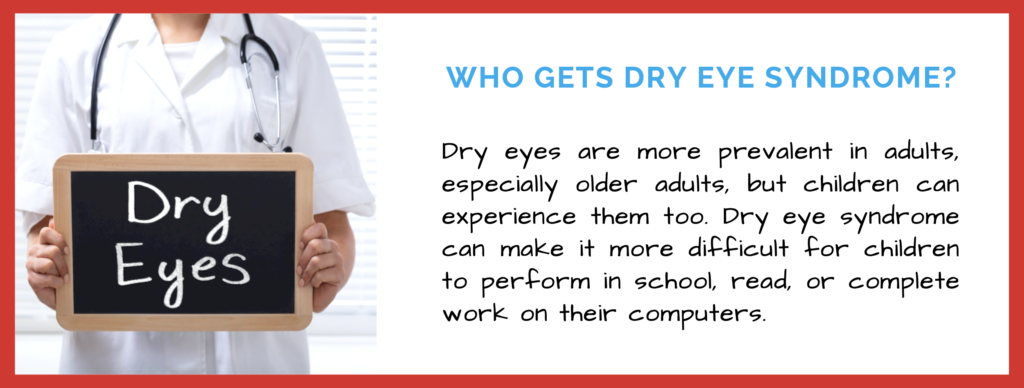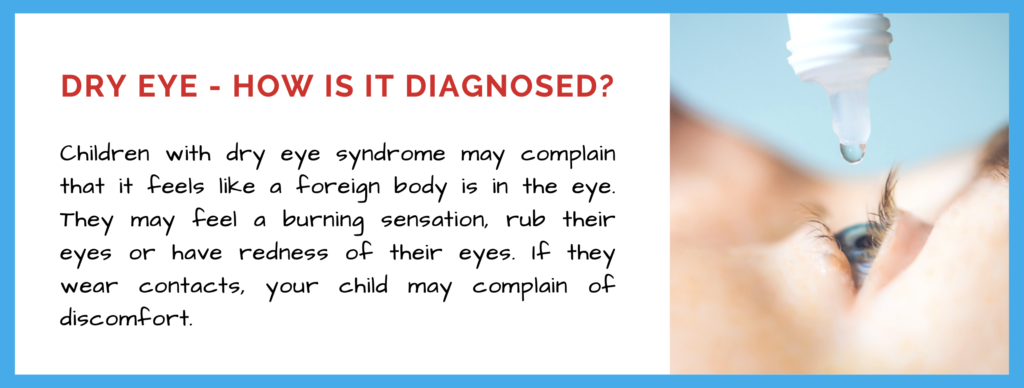Just like adults, children can suffer from chronic dry eyes. There is even a name for the condition: dry eye syndrome. It is caused by a deficiency in the tear film that lubricates the eye. Dry eyes can be irritating and painful. Sometimes the syndrome can affect vision.
With every blink, tears spread over the surface. Tears are formed by several glands that surround the eye. The tears exit through two tiny drainage ducts located in the inner corner of the eye.
This blog post will help you to identify if your child has symptoms that are consistent with dry eye syndrome.
Who Gets Dry Eye Syndrome?
Dry eyes are more prevalent in adults, especially older adults, but children can experience them too. Dry eye syndrome can make it more difficult for children to perform in school, read, or complete work on their computers.
There are several possible causes for dry eye syndrome in children:
- One common cause is evaporation eye disease. This condition is caused by a gland dysfunction making it more difficult for the eye to produce tears.
- Blepharitis is an inflammation of the eyelid caused by a possible infection. It affects the tear film coating the cornea and causes dry eye symptoms. Blepharitis may be associated with other conditions in children, including rosacea and other skin conditions.
- Herpes simplex infections are common in children and can affect the eye. The result is a disruption in the ability to secrete tears. It can affect the cornea or cause inflammation on the surface of the eye.
- Medications can also cause dry eye symptoms. “Dry eye” can be a side effect of birth control medicine prescribed to teenage girls. Other drugs such as those used for skin conditions such as acne can also cause dry eye syndrome.
How do Pediatric Ophthalmologists Diagnose Dry Eye Syndrome?
Children with dry eye syndrome may complain that it feels like a foreign body is in the eye. They may feel a burning sensation, rub their eyes or have redness of their eyes. If they wear contacts, your child may complain of discomfort.
The symptoms of dry eye syndrome include:
- Itchiness
- Blurred vision
- Ocular irritation
- Mucus and crusting on the eyelashes
If symptoms are persistent and do not improve with time, it is important the child sees a pediatric ophthalmologist to get an accurate diagnosis.
How is Dry Eye Syndrome Treated?
There are several ways in which dry eye syndrome can be successfully managed. The goal of treatment is to increase tear production while maintaining tear film volume.
- Treatment options include artificial tears, gels, or ointments to lubricate the corneal surface.
- You can boost the humidity in the air at home or in the child’s bedroom to help with symptom relief.
- If medications are the underlying cause of “dry eye,” it may be advisable to consider alternative treatments.
Does Your Child Need a Pediatric Ophthalmologist?
If you are concerned your child has symptoms of dry eye syndrome, then it is time to have them evaluated by a trusted and experienced pediatric ophthalmologist in NJ. Pediatric Eye Associates, LLC is here for your family.
Our experienced and exceptional doctors, Amy Lambert, MD and Rachel Bloom, MD, are board-certified pediatric ophthalmologists. They offer compassion, care, and patience, to develop the best treatment plan for your child’s vision concerns.
We pride ourselves on the results we achieve with our patients. The key is our medical expertise and the relationship between the patient and their families.
Contact us if you have any questions or if you would like to schedule an appointment. We look forward to seeing you soon!
The material contained on this site is for informational purposes only and DOES NOT CONSTITUTE THE PROVIDING OF MEDICAL ADVICE, and is not intended to be a substitute for independent professional medical judgment, advice, diagnosis, or treatment. Always seek the advice of your physician or other qualified healthcare provider with any questions or concerns you may have regarding your health.


